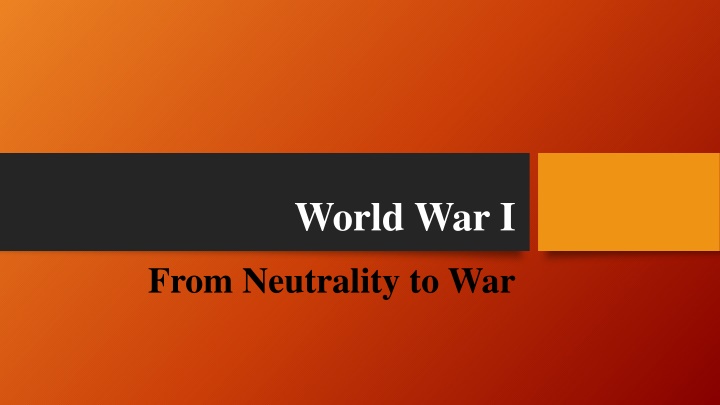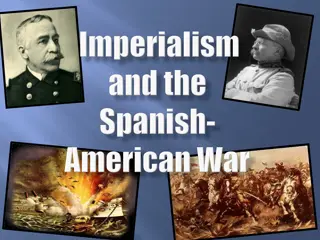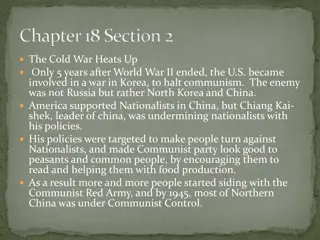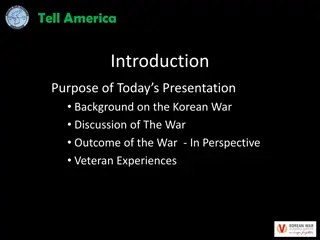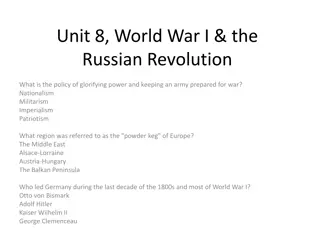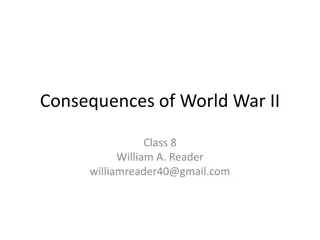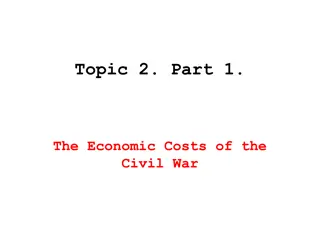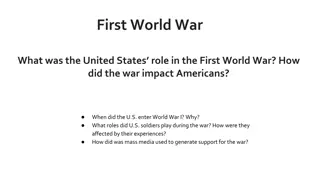World War I: Triggers and Ramifications
The causes of World War I, ranging from militarism and alliances to imperialism and nationalism, created a volatile environment in Europe. Nationalism led to heightened international rivalries, while militarism and an arms race added fuel to the fire. The quest for power, territory, and economic dominance fueled tensions among major powers, ultimately erupting into a brutal conflict that engulfed the globe.
Download Presentation

Please find below an Image/Link to download the presentation.
The content on the website is provided AS IS for your information and personal use only. It may not be sold, licensed, or shared on other websites without obtaining consent from the author.If you encounter any issues during the download, it is possible that the publisher has removed the file from their server.
You are allowed to download the files provided on this website for personal or commercial use, subject to the condition that they are used lawfully. All files are the property of their respective owners.
The content on the website is provided AS IS for your information and personal use only. It may not be sold, licensed, or shared on other websites without obtaining consent from the author.
E N D
Presentation Transcript
World War I From Neutrality to War
The Causes of World War I The MAIN Causes of World War I Militarism Alliances Imperialism Nationalism
The Causes of World War I Until 1914, there had not been a large-scale war in Europe in almost 100 years Despite the illusion of polite diplomacy, underneath the surface was a powder keg of nationalism, militarism, entangling alliances, and imperialism These factors would lead to a brutal conflict that would quickly stretch around the world
Nationalism Nationalism (devotion to one s nation) kick-started international and domestic tension 1800s: many began to reject the idea of a nation being a collection of different ethnic groups in favor of nations with a single ethnic group
Nationalism This led to an intense form of nationalism that heightened international rivalries After 1871, France wished to avenge its humiliating defeat by a collection of German states and regain the territory of Alsace-Lorraine that was lost in the conflict Social Darwinism added to the fire of nationalism, believing the best country would come out ahead
Nationalism Nationalism destabilized old multinational empires such as Austria-Hungary and the Ottoman Empire The emergence of an independent Serbia posed a threat on Austria- Hungary by trying to gain Austro- Hungarian territory where Serbs lived
Nationalism Nationalist sentiments also spilled over into the economic goals of the nation Industrial output, trade, and possession of an overseas empire were economic yardsticks of wealth and greatness Britain and France had overseas empires, while Germany, Italy, Japan and US rushed to join the imperial race Nations jostled among themselves to carve out colonies in Africa and Asia
Militarism and an Arms Race Many European leaders believed that a great war was coming Leaders began increasing the size of their armies and stockpiling weapons Germany did the most to prepare their military for the coming conflict
Militarism and the Arms Race Germany built up its standing army, had the largest supply of guns in Europe, and built a navy to rival Britain s To keep up, Britain increased the size of its navy as well A spirit of militarism (glorification of the military) fueled the arms race even more
Militarism and the Arms Race The arms race in Europe ensured that the next war to be fought would involve more troops and more technologically advanced weapons than ever before These weapons would change the nature of warfare forever
Alliances European leaders also prepared for war by forming alliances Two major alliances formed in Europe prior to 1914: Triple Alliance (Germany, Austria- Hungary, Italy) Triple Entente (France, Russia, Great Britain)
Alliances Alliances allowed European leaders to act recklessly, because they knew they had powerful allies to back them up if they declared war European began thinking less of the advantages of peace, and instead the possible gains of war European leaders hoped that a war would smooth over domestic problems
Imperialism Germany and Italy quickly developed imperialist ambitions after their unifications in the late 19thcentury As Germany expanded into Africa, it created tension with Britain, who already held a significant portion of the continent
Imperialism The need for raw materials and resources to fuel industry was a huge draw for countries The tension created by the competition for empire led Europe to the brink of war
The Spark On June 28, 1914 Archduke Franz Ferdinand, heir to the Austrian throne and his wife Sophie visited Sarajevo, the capital city of Bosnia A group known as the Black Hand planned to assassinate the Archduke
The Spark The Black Hand was made up of young Serbs who believed that Bosnia should be an independent nation While the Archduke was traveling through the streets of Sarajevo, Black Hand member Gavrilo Princip spotted the vehicle and shot the Archduke and his wife
Alliances and a Chain Reaction The assassination of Franz Ferdinand sparked the conflict that evolved into World War I Austria-Hungary s ally, Germany sent a promise that they would support Austria if a war began
Alliances and a Chain Reaction With Germany s backing, Austria sent an ultimatum to Serbia demanding their cooperation in an investigation into the assassination Serbia did not agree to the demands and Austria- Hungary declared war on July 28, 1914 Due to the alliances, a localized conflict quickly spread to ingulf the world
Alliances and a Chain Reaction In August, Russia began mobilizing to help its ally Serbia, which caused Germany to declare war on Russia France, Russia s ally, declared war on Germany, and the next day Germany declared war on Belgium to go through that country to attack Germany Great Britain declared war on Germany due to Britain being allied to France and Belgium
Alliances and a Chain Reaction In less than a week, the Central Powers of Germany and Austria-Hungary were at war with the allies of Britain, France, Russia, and Serbia Germany advanced through Belgium and were only 30 miles from Paris when Britain and France counterattacked, stopping Germany near the Marne River
Technology Leads to a Stalemate After the Battle of the Marne, the Germans began digging trenches and fortifying their position Germans used machine guns and artillery killing thousands of French and British soldiers, forcing the British and French to dig their own trenches Soon 450 miles of trenches stretched from the coast of Belgium to the border of Switzerland
Technology Leads to a Stalemate The deadly war dragged on for years, primarily because the defensive weapons were better and more devastating than the offensive ones In virtually every battle, the attacking force suffered horribly, leading to a deadly stalemate
Trench Warfare The stalemate led to gruesome conditions for the men, including trench foot from standing for hours in wet, muddy trenches Soldiers faced lice, rats, and constant fear Casualties mounted quickly, 1 million French soldiers were killed or wounded in just the first 3 months of the war
Wilson Urges Neutrality As war waged in Europe, President Woodrow Wilson called for Americans to remain neutral Wilson feared that in a country made up of people of different origins, getting the US involved in the war would pit Americans against one-another
Wilson Urges Neutrality At first, most Americans viewed the war as a distant European quarrel for land and power, unless American interests directly affected, they wanted no part in it Many Americans felt the war s effects and held a preference for one combatant or another Many businesses benefited from increased demand by European nations for American goods
Divided Loyalties In 1914 1/3 of Americans foreign born and many still thought of themselves in terms of their former homelands Some German Americans and Irish Americans felt strongly that the Central Powers were justified in their actions Most Americans sided with Britain and France, both of which had strong ties to the United States
American Opinion Crystallizes 3 Opinions Crystallized: Isolationists: believed war was none of America s business Interventionists: felt the war affected American interests and the US should fight with the Allies Internationalists: believed the US should play an active role in war and work to achieve peace but not enter the war
Neutrality Gives Way to War President Wilson was an internationalist and greatly desired peace around the world Wilson originally attempted to use his influence to bring about peace
Britain Blockades Germany One early British strategy was to use its navy to blockade Germany and prevent goods from reaching Germany International law stated weapons could be confiscated, but food, medicine, etc. could not Britain expanded the idea to include food and other nonmilitary goods
Unrestricted Submarine Warfare Germany responded to Britain s blockade by attempting to blockade Britain using their U-boats to sink Allied ships On May 7, 1915 a German U-boat sank the British passenger liner Lusitania
Unrestricted Submarine Warfare German officials correctly claimed the ship was carrying contraband, however this was ignored President Wilson condemned the sinking, but still wanted peace Germany kept the US out of war for awhile by promising to stop sinking passenger ships until breaking that promise in 1916, sinking the Sussex
Wilson Prepares for War Though Wilson wanted peace, he realized more and more that the US was heading toward war In 1915, he began making moves to prepare the nation for war 1916: Congress passed two pieces of legislation to prepare for the US involvement in the war
Wilson Prepares for War The National Defense Act increased the size of the army by expanding the size and scope of the National Guard The Naval Construction Act ordered the construction of several naval vessels to enlarge the nations navy Despite all of this, in 1916 Wilson ran for reelection on the slogan He kept us out of war and won another term as president
America Enters the War In early 1917, two events occurred that pushed the US toward war The US trade with the Allies had sustained Britain and France in the war while Germany was suffering from the British blockade Germany felt desperate and needed to take desperate actions to ensure their own victory
America Enters the War January 1917: German Foreign Minister Arthur Zimmerman sent the Zimmerman telegram to Mexico Proposed that if the US declared war on Germany, Mexico should declare war on the US After German victory, Mexico would get back the states of Texas, New Mexico, and Arizona
America Enters the War The telegram was intercepted by the British and given to American authorities The Germans then announced they would again enact unrestricted submarine warfare against the British Americans were shocked about the Zimmerman telegram, and on April 2, 1917 Wilson asked Congress for a declaration of war against Germany, which was declared on April 6
